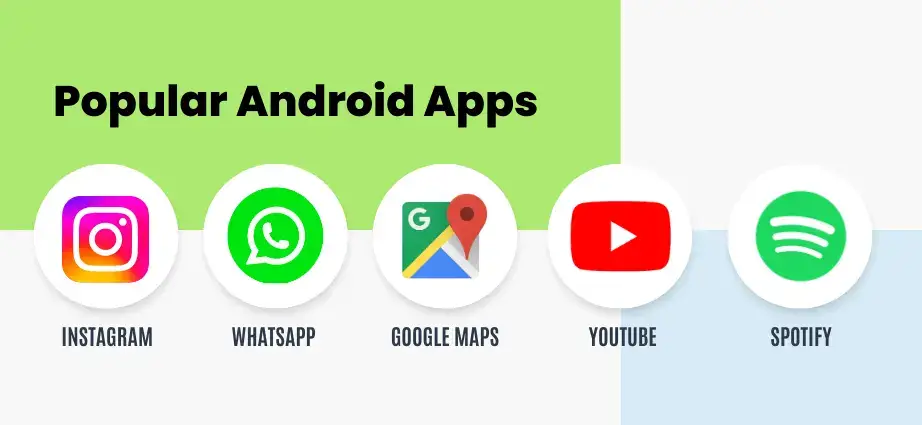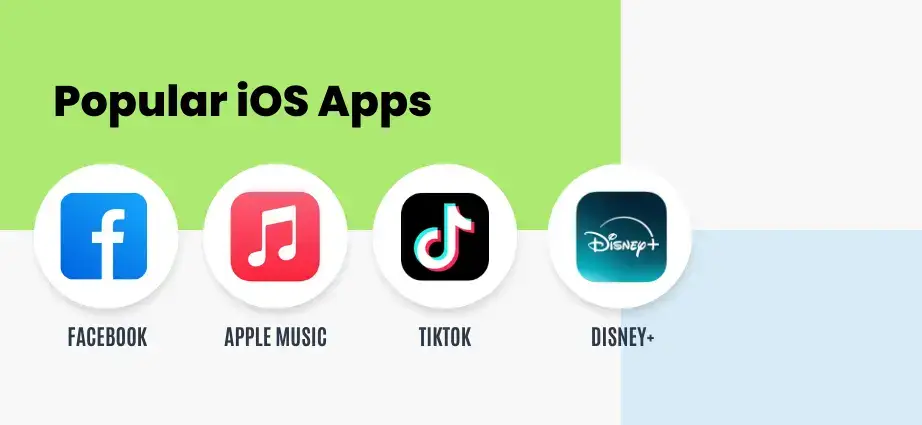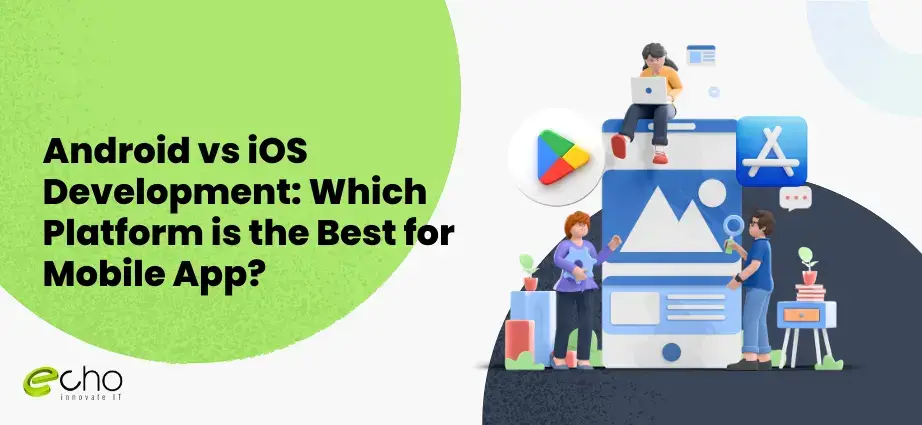best platform for mobile app development
Mobile apps have become an integral part of our daily lives, providing us with a wide range of services and information at our fingertips. From social media and entertainment to banking and shopping, there’s an app for almost everything we need. An increasing number of people are turning to their android devices and apple devices to access the internet and interact with brands and businesses. Whether it’s using android phones or apple apps, people are consistently engaging with mobile applications.
By creating apps, you can tap into this vast and growing market, reaching new customers and providing them with a convenient and engaging way to interact with your brand. In addition to the increased reach and customer engagement, mobile apps can offer a range of benefits for businesses, including improved productivity and efficiency, customer loyalty and retention, and the ability to gather valuable data and insights from user behavior.
If you’re considering mobile app development, you’ll want to evaluate the development tools available, such as android studio for android devices or other cross-platform solutions. The development process can vary, especially when dealing with device fragmentation. This means accounting for different screen sizes, OS versions, and performance capabilities across both android phones and apple devices.
Additionally, understanding the development cost and choosing the best language for app development is crucial in determining your app’s overall viability. For mobile app developers, it’s essential to consider factors like the user interface and target audience to create an app that will resonate with your user base.
When embarking on the journey to create apps, selecting the right platform is one of the most critical decisions. With Android and iOS dominating the mobile market, understanding the nuances of each platform can significantly impact the development process, development cost, and app success. This guide explores the key differences and considerations between Android and iOS for businesses, mobile app developers, and individuals seeking to create engaging and successful mobile applications.
Mobile app development has become essential to our digital lives, with several apps available for various uses. Mobile apps have transformed how we engage with technology and the world, from social networking to productivity tools. One of the most critical decisions when developing a mobile app is using Android or iOS.
The choice between Android and iOS can significantly impact the success of your software. Each platform has distinct qualities, advantages, and limitations; recognizing them is critical for making an informed decision.
This blog post attempts to thoroughly compare Android vs iOS development, highlighting the essential considerations to consider when choosing the ideal platform for your mobile app. By the end of this blog, you will better grasp both platforms’ strengths and drawbacks, allowing you to make an informed selection consistent with your app’s aims and target audience.
What is Android App Development?
Understanding the Market Share and User Base
- Android Devices: With over 70% of the global market share, Android has a massive and diverse user base. From budget-friendly Android phones to premium flagship devices, Android offers accessibility to a wide audience.
- Apple Devices: iOS caters to a smaller but more affluent audience, especially in regions like the US and Europe. Apple apps are known for their seamless performance and excellent monetization potential.
2. Development Process and Tools
Android Development:
Android development is facilitated by Android Studio, an advanced IDE offering a robust set of development tools. Developers rely on programming languages like Java, Kotlin, and Python app development for building powerful applications.- Benefits: Flexibility, open source ecosystem, and compatibility with various devices.
- Challenges: Device fragmentation due to varying screen sizes and hardware configurations.
iOS Development:
iOS development is more streamlined, focusing on Apple’s proprietary mobile dev platform. Tools like Xcode and iOS app testing tools simplify the process.- Benefits: High performance, better user interface, and robust security.
- Challenges: Higher ios app development cost and strict App Store guidelines.
3. Development Costs and Licensing
- How Much Does a Mobile App Developer License Cost?
- Android: A one-time fee of $25 for a Google Play Developer Account.
- iOS: An annual fee of $99 for an Apple Developer Account.
- How Much Does It Cost to Make an App?
The mobile application cost depends on features, complexity, and platform. Developing for iOS often incurs higher costs due to premium development standards.
4. Monetization: In-App Purchases and Beyond
- Android: While app purchases are less frequent on Android devices compared to Apple, its large user base offers opportunities for ads and freemium models.
- iOS: Apple users are more likely to make app purchases, leading to higher revenue per user.
5. Cross-Platform vs. Native Development
For businesses targeting both Android and iOS, cross-platform app dev frameworks like Flutter and React Native are game changers.
- Flutter vs. React Native:
- Flutter offers fast development with a single codebase and customizable widgets for a consistent user interface.
- React Native, a JavaScript library, enables efficient mobile application code sharing and seamless integration with native modules.
6. Addressing Device Fragmentation
Android apps need to account for diverse hardware and software configurations. By contrast, iOS developers benefit from a more unified ecosystem with fewer devices to optimize for, reducing mobile testing tools complexity.
7. Testing and UI/UX Optimization
- Mobile Testing Tools: Platforms like Appium and TestFlight help mobile app developers test their apps effectively.
- Mobile App UI Tester: Tools like UI Automator (Android) and XCTest (iOS) ensure a polished user interface across all devices.
8. Choosing the Best App Development Agencies
Whether you’re developing in New York or globally, partnering with experienced agencies ensures your app stands out. The best agencies:
- Understand target audience needs.
- Optimize for screen size and functionality.
- Minimize development cost without compromising quality.
Google’s Android is the most extensively used mobile operating system worldwide. Its open-source nature, flexibility, and customization choices have made it popular among customers and manufacturers.
Android’s open-source nature, flexibility, and customization choices have made it popular among customers and manufacturers. It offers a high level of customization, allowing users to personalize their devices with various themes, launchers, and application icons. Users who want to personalize their smartphones will appreciate this versatility.
Advantages of Android Development
Open-Source Nature of Android Development
The open-source nature of Android allows mobile app developers to adapt and personalize the operating system to meet their needs. This flexibility enables developers to create apps that offer unique and innovative user experiences. With a vast and active Android development community, developers have access to numerous development tools, libraries, and support, which makes learning and troubleshooting easier.
Being open-source, Android eliminates the need for costly licensing fees, which significantly lowers development cost. This is especially beneficial for smaller businesses and startups looking to build mobile applications without incurring high initial costs.
Lower Development Costs with Android Development
With the abundance of open-source libraries and frameworks, developers can speed up the development process while reducing the need for extensive coding. This also helps in lowering app purchases or licensing fees, making it easier to manage the overall development cost. The availability of Android devices at various price points allows developers to test their apps across different android phones without going over budget.
Wider Device Compatibility Across Android Devices
Android is used across a broad spectrum of Android devices, from budget android phones to high-end tablets and wearables. This diversity ensures that your mobile app will have a wide reach, connecting with a larger user base. While device fragmentation and screen size variability may present challenges, Android provides powerful tools to help developers create apps that are responsive and adaptive to different screen sizes and resolutions.
Customization Options for Enhanced User Interface
One of Android’s standout features is its customization options. Users can personalize their devices with custom themes, launchers, and app icons, enhancing their user experience. Developers can further take advantage of this flexibility by designing custom widgets that integrate seamlessly into the user’s home screen, creating a more personalized and engaging user interface.
Best Languages for Android App Development
When it comes to the best language for app development, Android supports various programming languages for Android. Java and Kotlin are the most common programming languages for app development, but developers also have the option to use other application development languages depending on the requirements. These programming languages for app development help developers create feature-rich apps while ensuring scalability, security, and performance.
The most common program for app development on Android is Android Studio, a comprehensive mobile app programming software that supports multiple languages and offers tools for debugging, testing, and improving performance. With Android Studio, mobile app developers can effectively build and optimize their mobile applications for both Android phones and Apple devices, ensuring maximum reach.
Why Choose Android for App Development
With Android’s extensive open-source ecosystem, lower development costs, and customizable options, it’s clear why Android remains a preferred choice for mobile app developers. Whether you’re looking to build apps for Android or create applications for multiple platforms, Android’s flexibility in programming languages for app development and support for diverse devices offers a significant advantage.
If you’re planning to create apps that can cater to a global user base and reach a large target audience, Android is an excellent platform to start. For businesses and developers interested in building apps that deliver great performance, the combination of Android Studio and the open-source nature of Android ensures that you have the tools and support necessary to succeed.
Are you looking to partner with a top Android App Development Company in the USA? Contact us today to discuss your next app development project!
Disadvantages of Android Development
Fragmentation Issues
The diverse range of Android devices can cause fragmentation difficulties, as developers must assure compatibility across multiple screen sizes, resolutions, and hardware specs. The fragmentation of Android operating system versions can make supporting earlier versions and functionality difficult.
Performance Variations
Android apps’ performance varies according to the device’s hardware capabilities. Older or lower-end devices may have poorer performance than newer or higher-end devices. Developers must optimize their apps to ensure consistent performance across multiple devices, which can be time-consuming and complex.
Approval Process
While the approval procedure for the Google Play Store is generally straightforward, there may be delays or rejections if your app does not follow Google’s criteria. Google’s regulations can change over time, affecting the development and distribution of your app.
5 Popular Android Apps
Here is the list of 5 Popular Android apps dominating the market today.

What is iOS App Development?
The iOS app is software specifically designed for Apple’s iOS-powered iPhones and other Apple devices. These applications, created to run seamlessly on Apple’s proprietary mobile dev platform, are available on the App Store, where users can download or purchase apps. Developers earn revenue from app sales, with Apple taking a share. Additionally, in-app purchases provide developers with an extra revenue stream, enhancing profitability.
When considering how much does it cost to make an app, the iOS app development cost can vary significantly based on the app’s complexity, features, and design requirements. Developers must also factor in how much does a mobile app developer license cost, which for iOS is $99 annually.
Apple’s iOS mobile operating system dominates in high-income regions, renowned for its user-friendly interface and focus on performance. The mobile application cost may be higher for iOS due to the platform’s stringent quality standards. Tools like iOS app testing tools and mobile testing tools ensure apps deliver a polished experience, while mobile app UI tester tools optimize the user interface for Apple’s sleek devices.
For businesses exploring cross-platform app dev, frameworks like Flutter and React Native offer cost-effective alternatives. Comparing Flutter vs React Native helps developers choose the right approach for their project. Python app development is also gaining traction, simplifying app creation and expanding possibilities for developers.
The curated ecosystem of the App Store emphasizes dependability and security, with its rigorous review process ensuring high-quality apps. This makes partnering with the best app development agencies, especially in regions like App Development New York, critical for success. Whether you’re coding Android apps or exploring how to make an application for iOS, focusing on quality, user experience, and testing is essential for creating top-tier mobile application code.
Advantages of iOS Development
User Experience and Design
iOS is noted for its clean, user-friendly interface. Apple enforces stringent design requirements to guarantee a consistent and unified user experience across all iOS applications. Apple devotes meticulous attention to detail, producing a polished and refined user experience.
Higher Average App Revenue
iOS users typically have more disposable income and are prepared to pay for premium apps and in-app purchases. Apple’s App Store algorithms prefer high-quality apps, which can lead to increased visibility and income.
Stricter App Store Guidelines
Apple’s strict app review process contributes to the App Store’s high level of quality. Strict standards assist consumers in avoiding dangerous programs and scams.
Integration With the Apple Ecosystem
iOS apps can work smoothly with other Apple devices and services, such as iCloud, Apple Music, and Apple Pay. This connection might provide users with a more connected and personalized experience.
Hire iOS App Development Services in India and USA from Echoinnovate IT. Get in touch to know more!
Disadvantages of iOS Development
Higher Development Costs
Developing for iOS necessitates using specific tools and programming languages, thus increasing development expenses. Testing iOS apps on various devices can be costly, as Apple products are often more expensive than Android devices.
Limited Device Compatibility
iOS is predominantly used on Apple devices, which limits your app’s potential reach compared to Android. iOS devices may have hardware constraints that impact your app’s functioning.
Depending on Apple’s Approval Process
The Apple App Store review process can sometimes cause delays in app clearance. Changes to Apple’s regulations can influence your app’s development and distribution.
5 Popular iOS Apps
Check Out the List of 5 famous apps developed from ios framework:

Android vs iOS Development: Key Comparison
| Parameters | iOS | Android |
|---|---|---|
| Target Systems | iPhone, iPads, Apple watches, iMac, AirPods | Smartphones, tablets, watches, laptops, computers |
| Kernel Type | Hybrid | Linux-based |
| License Used | Proprietary, APSL, and GNU GPL | Apache 2.0 and GNU GPLv2 |
| Languages | Mainly written in C, C++, and Swift | Written in C, C++, and Java |
| System Update | Manages updates through software update | Manages updates through system software update |
| Application Development Tools | Swift is used for its development | Supported by Java and Kotlin |
| Internet Browser | Safari is the default browser | Google Chrome is the default, but others can be installed |
| Voice Assistance | Siri | Google Assistant |
| Third Party Applications | Blocks third-party app stores | Doesn't block third-party app stores |
| Customizability | Restricted until hacked | Highly customizable |
| File Transfer | More difficult than in Android | Easy compared to iOS |
| Development Environment | Xcode | Android Studio |
| Design Difference | XIB and Storyboard | XML language |
| Web Mapping Services | Apple Maps and Google Maps (not default) | Google Maps |
| App Publishing | Apple Store tests and verifies apps before approval | Publishing apps is easier |
Android vs iOS Development : Cost & Time
The price of developing an Android vs iOS app depends on many variables, including development platforms, tools, the number of devices targeted, etc. Because Android app development is more complex than iOS app development, it takes longer. Because Android OS is utilized in devices made by different manufacturers, developing apps for this platform is more difficult owing to compatibility difficulties, which drives up the cost of developing apps for Android compared to iOS.
Android vs iOS Development : App Development
The two most widely used mobile operating systems are Google’s Android and Apple’s iOS. When it comes to the mobile application development process, one must decide whether to create apps for iOS or Android. Indeed, the development process for both iOS and Android is very different in terms of the programming language they use. Swift and Objective-C are the two main programming languages used for creating iOS mobile applications. Objective-C is a common and straightforward programming language for iOS developers.
Java is a cross-platform and compatible programming language. In contrast, Kotlin is a cross-platform, open-source programming language. Because Kotlin is a more straightforward language, its code is more precise and requires less maintenance.
Android vs iOS Development : Design Difference
Regarding picture or colour controls, iOS apps are somewhat constrained. With Android, though, this is different. With Android programming, you can utilize the XML language to change your colour schemes and graphics. Android has more possibilities when building your controls and layouts. Still, iOS offers a more straightforward approach, making it a suitable choice for creating an app with a flawless linear design. The advantage of iOS, however, is that it lacks Android’s more sophisticated design language, such as XIB and storyboard, and an Android app developer may assist you with a deeper understanding.
Developers can choose how their programs are designed in some cases. However, there are a few restrictions when it comes to personalizing iOS applications. Developers cannot include animation effects, unique control designs, or other elements that would alter their applications’ appearance and user interface. If you need professional assistance, iOS application development services might be your one-stop shop.
Android vs iOS Development : App Publishing And Security
It’s simple to publish apps on the Google Play store. An app’s launch for consumers typically takes a few hours. However, before approving an app, the Apple store verifies and tests it for faults. Thus, publishing an app on the Apple App Store takes longer and costs more than it does on the Play Store.
The procedure for submitting and moderating applications on the App Store is intricate. Apps that are submitted have stringent security standards, making downloading programs from this store far safer. Apple Store moderation prevents apps from reading SMS messages and recording calls, guaranteeing that the apps are extremely safe.
Conversely, unlike the App Store, the Google Play Store lacks strict moderation. Third-party permission systems must be integrated for an Android app to be really safe.
Conclusion
The decision to design an iOS or Android app is influenced by various factors, including your target market, operating territories, and business needs. Furthermore, factors such as maintenance, finances, and development time must be considered when deciding whether or not to create an app for a given platform.
Echoinnovate IT creates and designs bespoke web, android, and iOS development apps, focusing on several other services such as Flutter, React Native, Node JS Development, and much more. We provide top-tier IT solutions at affordable pricing by leveraging cutting-edge technologies such as machine learning and artificial intelligence. If you have any questions, please contact us at Echoinnovate IT or share your project requirements for employing our professional developers.
FAQs
Which platform is easier for mobile app development: Android or iOS?
iOS is often considered easier for development due to its standardized hardware and software environment, while Android development can be more complex due to the wide variety of devices and screen sizes.
Which platform is more cost-effective for mobile app development?
Android development is generally more cost-effective due to its open-source nature and wider availability of resources. However, iOS apps tend to generate higher revenue, which can offset initial costs.
Which platform offers better customizability for mobile apps?
Android offers better customizability, allowing developers more freedom to tweak and adjust the user interface and functionality, whereas iOS has more restrictions to maintain consistency and security.
Which platform should I choose if I want to reach a global audience?
- Android is the better choice for reaching a global audience, especially in emerging markets. iOS, however, is more popular in regions like North America and Western Europe, where users are often more willing to spend on apps.



